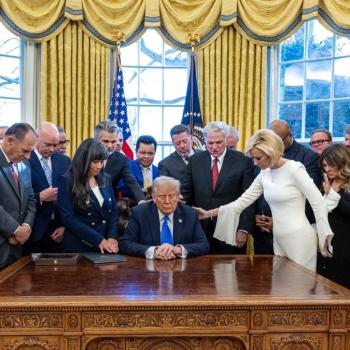The semester is over and one of the last things I did this autumn was to teach a class of lay people and clergy preparing to work as spiritual directors. To the dismay of at least one of my students, I noted that as spiritual directors they might be the only people in their directees' lives who might help them understand the Christian faith and its relevance for their daily lives. "Be prepared," I explained, "to discover that even the church people who come to you for direction may know little or nothing about their faith or how to apply it to their lives."
The student who was the most dismayed, protested, "But ministers graduate from seminaries and you are charged with their preparation. Why would they know so little about their faith?"
The answer, of course, is complex and there are a variety of explanations that can be given.
For one thing, seminaries don't ordain clergy. They prepare them. And like any student body, seminarians are a mixed bag. They come to seminary for a variety of reasons (not all of them good). And they are not all equally well qualified. It is also extraordinarily easy to over-estimate the influence of any academic institution. No one can guarantee the outcome of an education -- never mind the choices that alumnae make after they graduate -- just as no law school can guarantee that their graduates are either good lawyers or ethical in their conduct.
Churches also contribute to the chaos. Bishops, commissions, and boards charged with ordaining clergy don't always possess any clear idea about what it means to form clergy, never mind educate them -- and, worse yet, they aren't always interested. It is just as common for church leaders to size up prospective clergy on the basis of gender, sexual orientation, and political prejudice.
There are also two other common complications on many boards and commissions charged with oversight for the ordination process: The people making the decisions are often threatened by the truly competent and afraid to say "no" to the incompetent. I have lost count now of the number of times I have watched people advanced for ordination who were bright, able, keen thinkers, deeply carrying, and, yes, called to ordained ministry -- who were told "no" by the Lilliputians charged with making decisions about ordination.
The still deeper problem is this: Neither churches nor seminaries are clear about what we are trying to achieve when we prepare clergy. Are we looking for subject mastery, professional preparation, effectiveness -- or something deeper? The answer, it seems to me, is "yes." But the something deeper is, in fact, the moral and spiritual formation of people who are faithful Christians, as well as clergy. We can no longer presume that the two are one in the same, if they ever were.
The Chronicle of Higher Education recently featured an article written by a young man who works for a term paper service. Ed Dante (as he calls himself) spends his time ghostwriting assignments and dissertations for students who purchase his help, and among the students he helps to cheat are a number of seminarians. His observations illustrate my point:
I do a lot of work for seminary students. I like seminary students. They seem so blissfully unaware of the inherent contradiction in paying somebody to help them cheat in courses that are largely about walking in the light of God and providing an ethical model for others to follow. I have been commissioned to write many a passionate condemnation of America's moral decay as exemplified by abortion, gay marriage, or the teaching of evolution. All in all, we may presume that clerical authorities see these as a greater threat than the plagiarism committed by the future frocked.
Clergy do, in fact, need to "know" something. They need to know a great deal about scripture, the history of the faith, theology, pastoral care, preaching, leadership, and counseling. They need to be discerning social and cultural critics. They need to know the human soul.
They also need to be well prepared professionally, because their lives are lived out in complex systems that make extraordinary demands upon them of radically different kinds. Churches look like institutions, mimic businesses, and are all about relationships. Those are not easy waters to navigate and from moment to moment it is not always clear what is needed or expected of clergy.
Clergy need to be effective. But what is effectiveness? Numbers, growth, efficient organization, and consumer satisfaction are categories that don't apply neatly or even coherently to the primary work that clergy do. The primary work of clergy is to help others deepen their own relationships with God and to live their lives by values that are often at odds with the appetites of the culture. Numbers and growth may or may not measure the ability of a clergyperson to do this.





